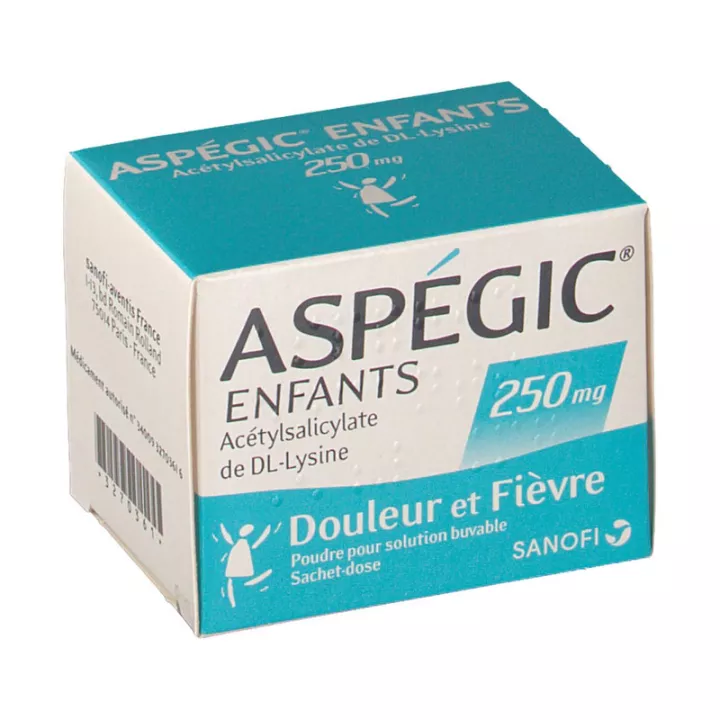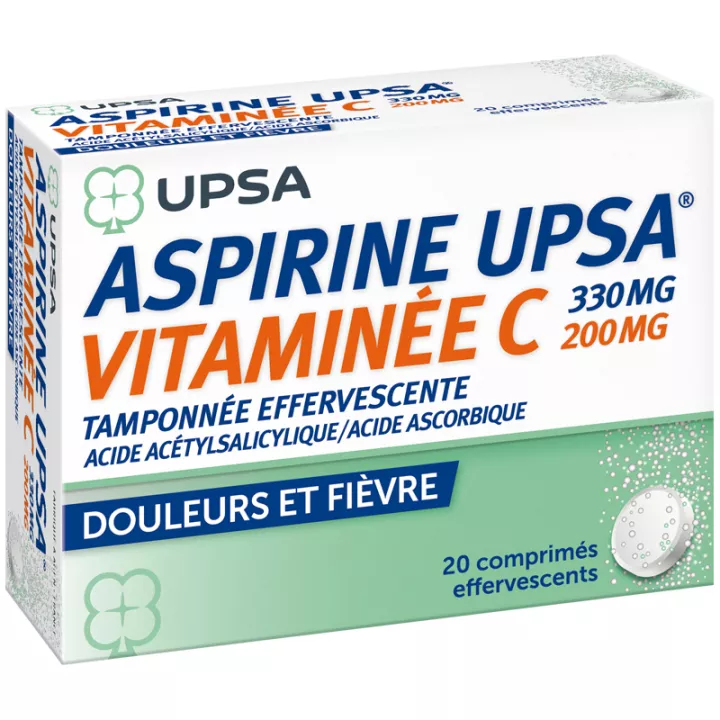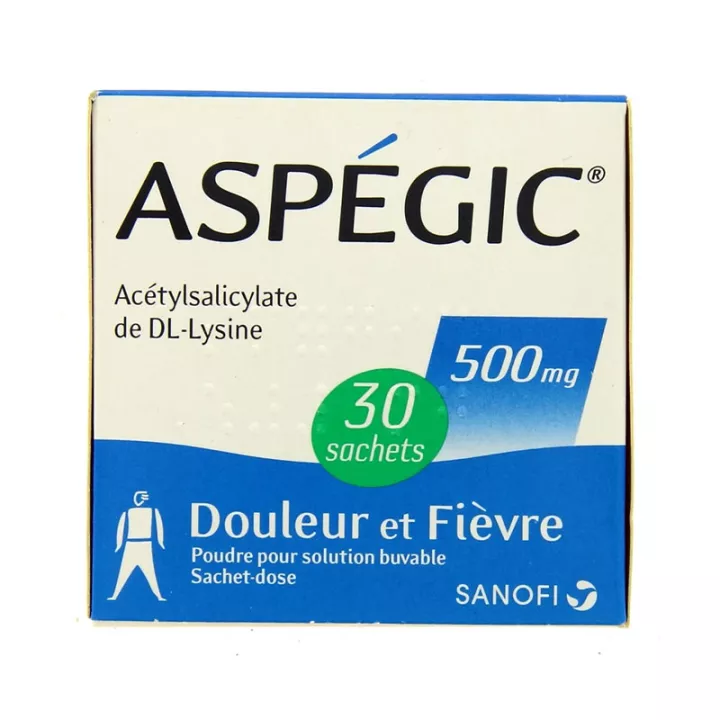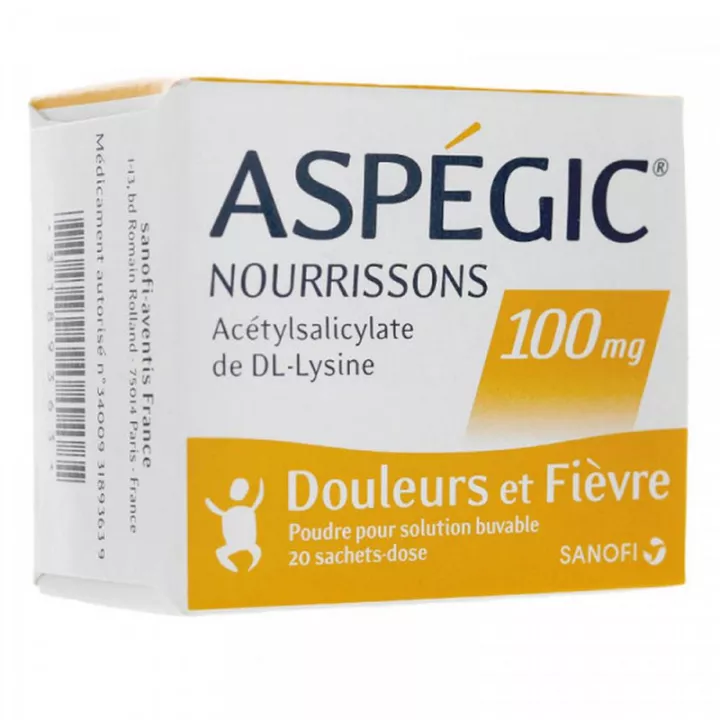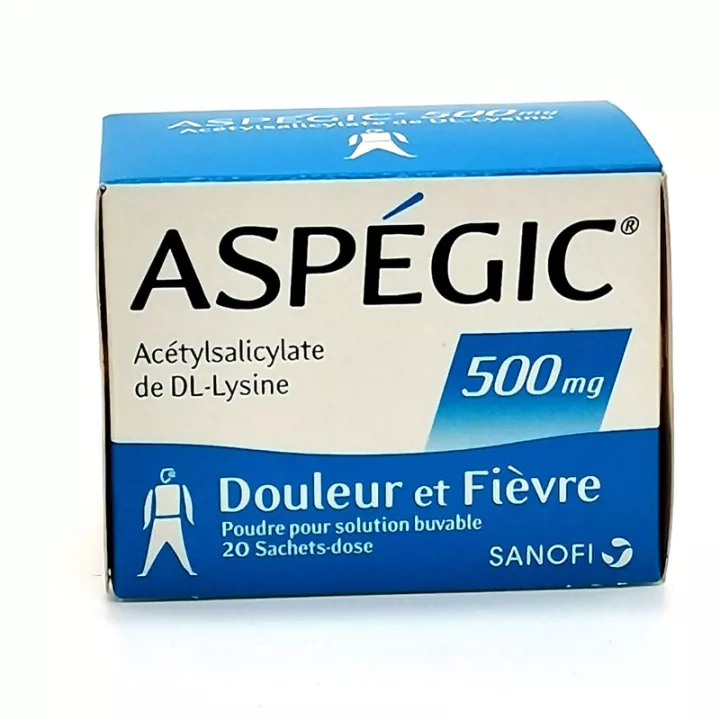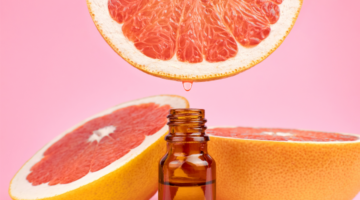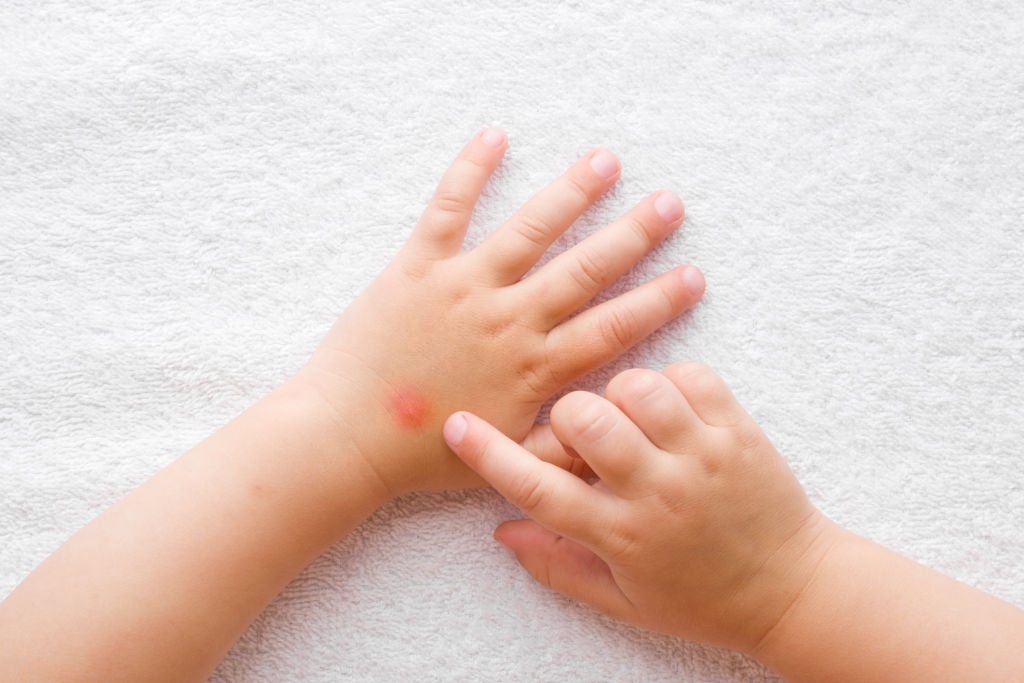NOTICE
ANSM - Last updated: 31/07/2017
Name of the medicinal product
ASPEGIC CHILDREN 250 mg powder for oral solution in sachet-dose
Acetylsalicylic acid
framed
Please read this leaflet carefully before you start using this medicine because it contains important information for you.
You should always use this medication exactly as prescribed in this leaflet or by your doctor or pharmacist.
· Keep this leaflet. You might need to read it again.
· Ask your pharmacist for advice or information.
· If you experience any of the side effects, talk to your doctor, or your pharmacist. This also applies to any side effects not mentioned in this leaflet. See section 4.
· You should contact your doctor if you experience no improvement or if your child feels worse after 3 days.
Do not use this medication for children.
What is in this leaflet?
1. What is ASPEGIC CHILD 250 mg powder for oral solution in sachet-dose and in which cases it is used?
2. What should I know before using ASPEGIC CHILD 250 mg powder for oral solution in a sachet-dose?
3. How to use ASPEGIC CHILD 250 mg powder for oral solution in sachet-dose?
4. What are the possible side effects?
5. How to store ASPEGIC CHILD 250 mg powder for oral solution in sachet-dose?
6. Package contents and other information.
1. WHAT IS ASPEGIC CHILDREN 250 mg powder for oral solution in sachet-dose WHAT IS IT FOR?
This medicine contains aspirin. Aspirin belongs to the family of non-steroidal anti-inflammatory drugs.
Aspirin can be used to calm pain (analgesic), lower fever (antipyretic) and / or decrease inflammation.
ASPEGIC CHILDREN 250 mg powder for oral solution in sachet-dose contains 250 mg of aspirin. He is used :
· in case of pain and / or fever such as headache, flu-like conditions, dental pain or aches,
· in the treatment of certain rheumatic affections.
This dosage is reserved for children weighing between 15 and 50 kg (about 3 to 15 years).
For children of different weights, there are other aspirin presentations with a more appropriate dosage. Do not hesitate to ask your doctor or pharmacist for advice.
2. BEFORE YOU USE ASPEGIC CHILDREN 250 mg powder for oral solution in sachet-dose?
If your doctor has told you about intolerance to some sugars, contact your doctor before using this medicine.
Never use ASPEGIC CHILDREN 250 mg powder for oral solution in sachet-dose:
· If your child is allergic (hypersensitive) to aspirin or any of the other ingredients of ASPEGIC CHILD 250 mg powder for oral solution in sachet-dose, mentioned in section 6.
· If your child is allergic (hypersensitive) to a drug of the same family as aspirin (non-steroidal anti-inflammatory drugs).
· If your child has already had asthma caused by taking aspirin or a medication from the same family.
· If your child is currently suffering from an ulcer of the stomach or duodenum.
· If your child has bleeding or if your doctor has identified a risk of bleeding.
· If your child has a serious illness of the liver, kidneys or heart.
· in pregnancy from the beginning of the 6th month (beyond 24 weeks of gestation) for doses of aspirin above 100 mg daily.
· If your child is taking another medication, make sure that the combination with ASPEGIC CHILD 250 mg powder for oral solution in a sachet-dose is not contraindicated (see section '' Other medicines and ASPEGIC CHILD 250 mg, powder for oral solution in sachet-dose '').
· If your child has a mastocytosis (disease of the cells involved in allergic reactions) because there is a risk of severe allergic reactions.
IN CASE OF DOUBT, DO NOT HESITATE TO ASK FOR THE OPINION OF YOUR DOCTOR OR YOUR PHARMACIST.
Warnings and Precautions
Before using ASPEGIC CHILD 250 mg powder for oral solution in sachet-dose.
ASPEGIC CHILDREN 250 mg powder for oral solution in sachet-dose is available without a prescription. However, you should consult your doctor before giving this medicine to your child if:
· rheumatic diseases,
· inherited red blood cell disease, also known as G6PD deficiency (as high doses of aspirin may cause destruction of red blood cells),
· history of stomach or duodenal ulcer or inflammation of the stomach (gastritis),
· history of digestive bleeding (vomiting of blood or presence of blood in the stool),
· kidney or liver disease,
· abundant rules,
· if your child is already taking another anti-inflammatory or anti-coagulant treatment (refer to "Other medicines and ASPEGIC CHILD 250 mg powder for oral solution in sachet-dose" for more details)
· viral disease, in particular varicella or influenza-like syndrome: cases of Reye's syndrome (rare, very severe disease, associating mainly neurological disorders and liver damage) have been observed in children with viral disease and receiving aspirin.
If your child is less than one month old, you should first consult your doctor before using any medicine containing aspirin, regardless of dosage.
During treatment in children
This dosage is suitable for children between 15 kg and 50 kg. For children weighing less than 15 kg or more than 50 kg, there are other aspirin presentations whose dosage is more suitable. Do not hesitate to ask your doctor or pharmacist for advice.
During treatment, see your doctor immediately if your child has:
· (see section 'Before using ASPEGIC CHILD 250 mg powder for oral solution in a sachet-dose'), stop taking the medication,
· bleeding or pain in the abdomen,
· an asthma attack. This may be a sign of an allergy to aspirin or a nonsteroidal anti-inflammatory drug.
In case of prolonged administration of large doses of painkillers, you should not increase the doses of ASPEGIC CHILD 250 mg powder for oral solution in sachet-dose in case of headaches.
Regular use of pain-relieving drugs can lead to kidney complications.
If your child needs to undergo an operation
Aspirin increases the risk of bleeding even at very low doses, even when taking this drug is several days old.
Tell your doctor, surgeon, anesthesiologist or dentist about the use of this medication if your child is undergoing any operation or intervention, even a minor one.
Blood tests
Tell your doctor if your child needs to take a blood test because aspirin can alter the level of uric acid in the blood.
Other medicines and ASPEGIC CHILDREN 250 mg, powder for oral solution in sachet- dose
This medicine contains aspirin. Your child should not take another medication containing aspirin or other medicines from the same family (also known as nonsteroidal anti-inflammatory drugs such as ibuprofen) at the same time. The combination of these medicines with ASPEGIC CHILD 250 mg powder for oral solution in a sachet-dose may lead to an overdose and increase the risk of adverse effects. Read carefully the notices of other medications your child is taking to ensure that these medications do not contain aspirin or nonsteroidal anti-inflammatory drugs. |
Never give high doses of ASPEGIC CHILD 250 mg powder for oral solution in a sachet-dose (see the paragraph '' Dosage ''):
· If your child takes doses greater than 20 mg / week of methotrexate (a medicine used to treat certain cancers and rheumatism).
· If your child is taking an oral anticoagulant (drug used to thin the blood) and has a history of stomach or duodenal ulcer.
Unless otherwise advised by your doctor, you should not give:
· high doses of ASPEGIC CHILDREN 250 mg powder for oral solution in a sachet-dose (see paragraph '' Dosage '') if your child is already taking:
o an oral anticoagulant or a heparin (medicines used to thin the blood),
o a non-steroidal anti-inflammatory drug or a corticosteroid (drugs used to treat a rheumatic disease, pain or inflammation).
· low doses of ASPEGIC CHILDREN 250 mg powder for oral solution in sachet-dose (50 to 375 mg per day) if your child is already taking:
o an oral anticoagulant (drug used to thin the blood) and has a history of stomach or duodenal ulcer.
· ASPEGIC CHILDREN 250 mg powder for oral solution in any sachet dose, if your child is already taking a medicine based on:
o ticlopidine or clopidogrel (medicines used to thin the blood),
o benzbromarone or probenecid (drugs used to treat gout),
o levothyroxine (medication used to treat insufficiency of thyroid gland secretion),
o pemetrexed (medication to treat certain cancers),
o anagrelide (a drug used to decrease the number of platelets in the blood).
o
o defibrotide (a drug used to treat a condition in which blood vessels in the liver are damaged and obstructed by blood clots),
o acetazolamide (a drug used to reduce eye pressure or the level of carbon dioxide in the blood),
o ticagrelor (medication used to prevent platelet aggregation).
Varicella vaccine : It is recommended to wait 6 weeks after vaccination before taking this medication.
Inform your doctor or pharmacist if you are using, have recently used or could use any other medication for your child.
ASPEGIC CHILDREN 250 mg powder for oral solution in sachet-dose with food, drink and alcohol
Alcohol use should be avoided during treatment due to increased risk of gastrointestinal injury.
Pregnancy, breast-feeding and fertility
If you are pregnant or breastfeeding, think you may be pregnant or plan a pregnancy, ask your doctor or pharmacist for advice before taking any medicine.
Pregnancy
Low doses, up to 100 mg daily :
Throughout pregnancy, if necessary, your specialist physician may prescribe aspirin at very low doses (less than or equal to 100 mg per day) in exceptional circumstances requiring specialized monitoring. If this is the case, it is very important to strictly follow your doctor's prescription, without exceeding the prescribed doses, and NOT to take ANY other medicine containing aspirin (including non-prescription drugs).
For doses above 100 mg per day:
· from 0 to 5 months of pregnancy (up to the 24th week of amenorrhea), your doctor should not prescribe this medicine unless absolutely necessary. In this case, the dose should be as low as possible and the treatment time should be as short as possible.
· from 6 months to the end of pregnancy (from the 25th week of amenorrhea), this medication is contraindicated, you should NEVER take this medication because its effects on your child can have serious consequences even fatal, especially on a cardiopulmonary and renal plan and this even with a single intake.
If you are taking this medication while you are pregnant, talk to your obstetrician gynecologist immediately so that appropriate monitoring is available.
feeding
Aspirin passes into breast milk, this medication is not recommended during breast-feeding.
Ask your doctor or pharmacist for advice before taking any medicine.
Fertility
It has been proven that this drug can decrease female fertility by acting on ovulation. This effect is reversible upon discontinuation of treatment.
Sport
Not applicable.
Driving and using machines
Not applicable.
ASPEGIC CHILDREN 250 mg powder for oral solution in sachet-dose contains lactose
This medication contains a sugar (lactose) which decomposes into galactose and glucose. Its use is not recommended in patients with galactose intolerance, Lapp lactase deficiency or glucose or galactose malabsorption syndrome (rare hereditary diseases).
If your doctor has already told you that you or your child have an intolerance to some sugars, contact your doctor before using this medicine.
3. HOW TO USE ASPEGIC CHILDREN 250 mg powder for oral solution in sachet-dose?
Always use this medication exactly as prescribed by your doctor or pharmacist. Check with your doctor or pharmacist if in doubt.
In case of pain, in case of fever
This dosage is reserved for the child weighing between 15 and 50 kg (about 3 to 15 years).
The dosage of aspirin depends on the weight of the child. The ages are mentioned for information purposes.
If you do not know the weight of the child, weigh it to give it the best dose.
Aspirin exists in many dosages, allowing the treatment to be adapted to the weight of each child.
Children from 15 to 20 kg (approximately 3 to 7 years)
The usual dose is 1 sachet per dose, to be renewed if necessary after 6 hours, without exceeding 4 sachets per day.
Children between 21 and 27 kg (approximately 6 to 10 years)
The usual dose is 1 sachet per dose, to be renewed if necessary after 4 hours, without exceeding 6 sachets per day.
Children from 28 to 40 kg (approximately 9 to 13 years)
The usual dose is 2 sachets per dose, to be renewed if necessary after 6 hours, without exceeding 8 sachets per day.
Children from 41 to 50 kg (approximately 12 to 15 years)
The usual dose is 2 sachets per dose, to be renewed if necessary after 4 hours, without exceeding 12 sachets per day.
In case of rheumatic diseases
Your doctor will tell you how much to use.
Method and route of administration
This medication is used orally. Pour the contents of the sachet into a glass and add a small amount of drink (eg water, milk, fruit juice).
Frequency of Administration
Taken at regular intervals, avoid peaks of fever or pain.
In case of pain and / or fever, the catch should be evenly spaced, including at night, depending on dosage (see section '' Dosage '').
In the case of rheumatic diseases, the spacing between catches must be at least 4 hours.
Duration of treatment
The duration of treatment is limited: · at 5 days in case of pain, · at 3 days in case of fever. In case of rheumatic diseases, your doctor will tell you how long you should give him this medication. |
Stop treatment and see your doctor immediately:
· if the pain persists more than 5 days or the fever lasts more than 3 days,
· if the pain or fever get worse,
· if you find that the treatment is not effective enough,
· or if any new signs occur (eg stiff neck, diarrhea, vomiting ...).
If your child took more ASPEGIC CHILD 250 mg powder for oral solution in a sachet-dose than it should have:
Consult your doctor immediately (especially if it is a child who has taken this medication accidentally).
Overdose can be fatal, especially in children. The main symptoms of intoxication are: of the ringing in the ears, a feeling of hearing, headaches, dizziness or even more severe cases of fever, severe hypoglycemia (decreased blood sugars), rapid fall in blood pressure, accelerated breathing, and loss of consciousness (coma).
If these symptoms occur, you should stop treatment immediately and go to hospital urgently for your child to be treated. |
Lung edema not associated with heart failure may occur in acute and chronic overdosage with aspirin (see 4. What are the possible side effects?). This edema can be fatal in case of overdose.
If you forget to use ASPEGIC CHILD 250 mg powder for oral solution for your child:
Do not give a double dose to compensate for the dose you have forgotten to give to your child.
If you have any further questions on the use of this medication, ask your doctor or pharmacist.
If you stop using ASPEGIC CHILD 250 mg powder for oral solution in sachet-dose:
Not applicable.
4. WHAT ARE POSSIBLE SIDE EFFECTS?
Like all medicines, ASPEGIC ENFANTS 250 mg powder for oral solution in sachet-dose may cause side effects, although not everybody gets them.
· Ulceration of the esophagus, stomach, and intestine, perforation of digestive ulcer, perforation of the intestine.
These reactions may or may not be associated with visible or non-visible gastrointestinal bleeding (black stools, stool blood, or oral rejection), regardless of the dose of aspirin, and in patients with or without warning signs or of serious gastrointestinal history. High doses increase the risk of bleeding.
· Life-threatening bleeding (hemorrhage)
· Cerebral haemorrhage (bleeding in the brain) that can be life-threatening, especially in the elderly. If this happens, tell your doctor immediately .
· Decrease in the number of platelets in the blood,
· Destruction of red blood cells (haemolytic anemia) in patients with G6PD deficiency.
· Abnormally low blood cell count (pancytopenia, bicytopenia, aplastic anemia), depletion of blood cell production (medullary insufficiency), abnormally low levels of certain white blood cells that can lead to serious infections (leucopenia, neutropenia, agranulocytosis).
· Allergic reaction: pimples and / or redness on the skin, hives, abrupt swelling of the face or neck, which can lead to difficulty breathing (angioedema), abrupt malaise with a significant drop in blood pressure (anaphylactic shock).
· Rash in rounded red patches with itching and burning sensation, leaving colored spots and appearing in the same places when the drug is resumed.
· Ringing in the ears, sensation of hearing loss, headache and dizziness. This may be an overdose.
· Reye Syndrome (onset of consciousness or behavioral disorder and vomiting) in a child with viral disease and receiving aspirin (see section 2 "Warnings and Precautions").
· Inflammation of blood vessels may be associated with involvement of joints, kidney, skin and gastrointestinal tract.
· Increased liver enzymes, liver damage (mainly liver cells).
· Chronic liver disease (chronic hepatitis).
· Acute inflammation of the pancreas during an allergic reaction related to acetylsalicylic acid.
· Edema (swelling due to fluid build-up in tissues) if you use high doses of ASPEGIC CHILD 250 mg powder for oral solution in sachet-dose.
· Lung edema not related to heart failure in long-term use and in the context of an allergic reaction to aspirin.
· Localized pain in the chest that can radiate to the left shoulder and jaw of allergic origin (Kounis syndrome).
· Kidney disease (renal failure).
In all cases, stop treatment immediately and seek prompt medical attention.
Other possible side effects:
· Abdominal pain.
· Bleeding (nose, gums), small red spots on the skin (purpura).
· Inflammation of the esophagus, stomach, duodenum and colon.
· Presence of blood in the sperm (hematospermia).
In these cases, you should consult your doctor.
Declaration of side effects
If you experience any side effects, talk to your doctor or pharmacist. This also applies to any side effects not mentioned in this leaflet. You can also report adverse reactions directly via the national reporting system: National Agency for the Safety of Medicines and Health Products (ANSM) and network of Regional Centers of Pharmacovigilance - Website: www.ansm.sante.fr
By reporting adverse reactions, you are helping to provide more information about the safety of the drug.
5. HOW TO STORE ASPEGIC CHILDREN 250 mg powder for oral solution in sachet-dose?
Keep this medicine out of the reach and sight of children.
Do not use ASPEGIC CHILD 250 mg powder for oral solution in a sachet-dose after the expiry date stated on the carton.
Store at a temperature not exceeding 25 ° C in the original package and away from moisture.
Do not throw any medicines into drains or rubbish. Ask your pharmacist to remove any medications you are no longer using. These measures will help protect the environment.
6. PACKAGE CONTENTS AND OTHER INFORMATION
What ASPEGIC ENFANTS 250 mg contains, powder for oral solution in sachet-dose
· The active substance is:
Lysine Acetylsalicylate ............................................... ............................................... 450 mg
Equivalent to Aspirin ............................................... .................................................. 250 mg
· The other components are:
Glycine, mandarin flavoring (containing lactose) and ammonium glycyrrhizate.
What is ASPEGIC ENFANTS 250 mg powder for oral solution in sachet-dose and contents of the pack
This medication is in the form of powder for oral solution in a sachet-dose.
Each box contains 10, 20, 50 or 100 sachets-doses.
Not all pack sizes may be marketed.
Marketing Authorization Holder
SANOFI AVENTIS FRANCE
82 AVENUE RASPAIL
94250 GENTILLY
Marketing Authorization Operator
SANOFI AVENTIS FRANCE
82 AVENUE RASPAIL
94250 GENTILLY
Maker
SANOFI WINTHROP INDUSTRIE
196 avenue du marechal june
45200 AMILLY
Names of the medicinal product in the Member States of the European Economic Area
Not applicable.
The last date on which this leaflet was revised is:
{month YYYY}.
Other
Detailed information on this medicine is available on the ANSM website (France).
Health Education Council:
WHAT TO DO IN CASE OF FEVER?
A child is considered to have a fever when the temperature exceeds 38 ° C.
Fever is a natural and frequent reaction of the body to fight infections, it is very rare that it is the only sign of a serious illness or that it leads to complications.
What has to be done :
Generally it is only above 38.5 ° C that treatment is envisaged; however this should not be systematic, especially if the fever is well supported by the child.
1) Before giving a medication for fever, always:
· remove blankets and superfluous layers of clothing,
· present often to drink to the child,
· do not overheat the room (about 18-20 ° C).
These 3 simple measures are sufficient in many cases to lower the fever.
Other measures are available (warm baths, ice packs, moist wraps ...), they are not necessarily more effective and will only be considered if they do not increase the child's ill-being.
2) In a second step, the child may be given a fever medication (called antipyretic medication).
Read carefully "Warnings and Precautions" and "Other Medicines and ASPEGIC CHILD 250 mg powder for oral solution in sachet-dose".
How should a fever medicine be used?
· respect the doses and delays between catches,
· give only one medication (do not combine or alter medications differently without medical advice),
· check that the child does not otherwise receive the same medicine (syrup, sachets, suppositories ...) or under another brand name.
If fever persists for several days, if new signs (especially stiffness of the neck, diarrhea, vomiting ...) or fever is badly supported (child slaughtered, losing its reactivity ...), you do not should not hesitate to consult a doctor.
WHAT TO DO IF PAIN?
You should consult a doctor:
· if you do not feel any improvement after 5 days of treatment,
· if the pains return regularly,
· if accompanied by fever,
· if they awaken your child at night.

